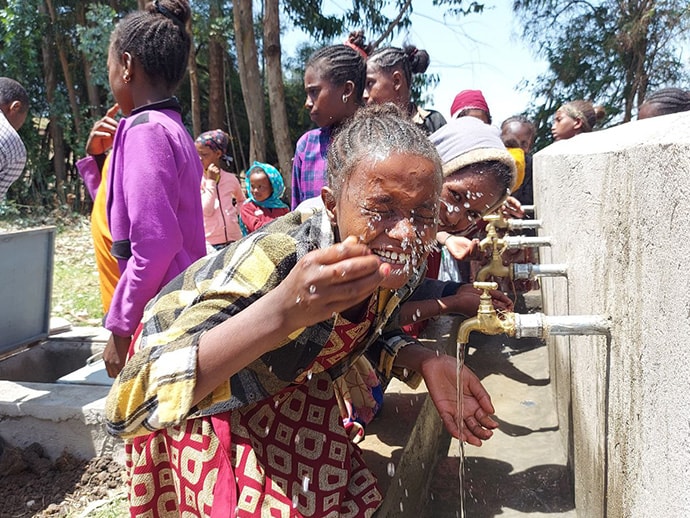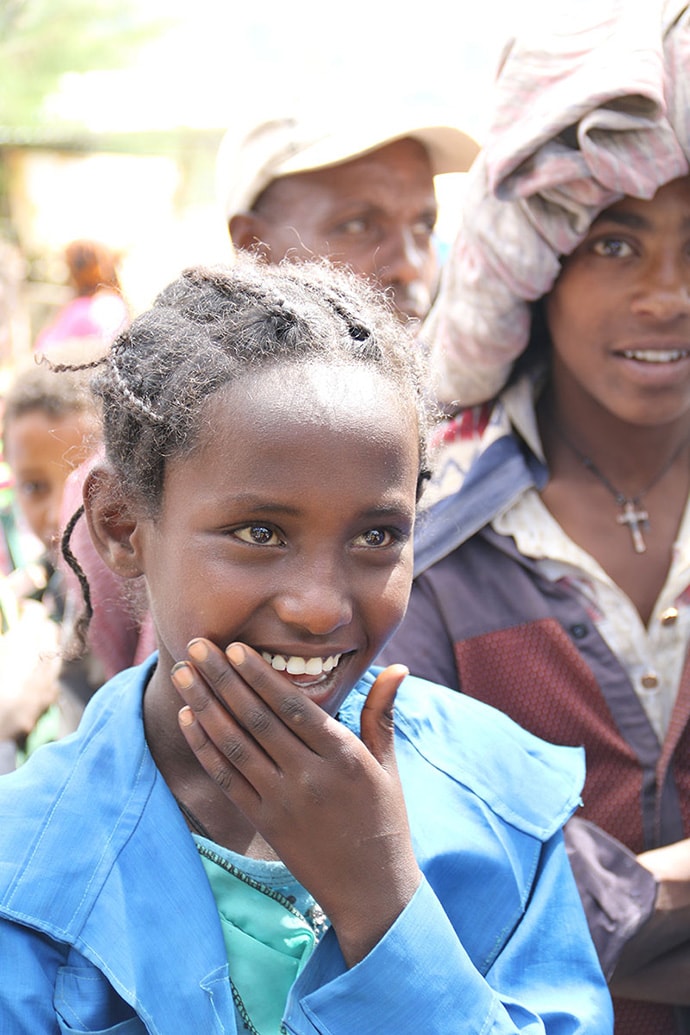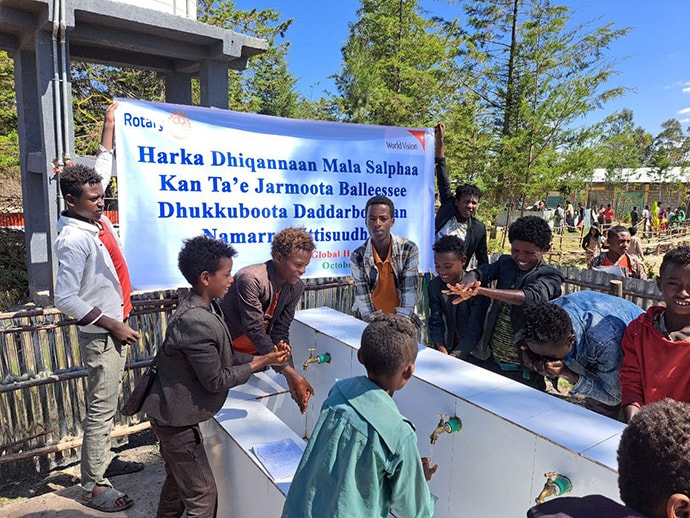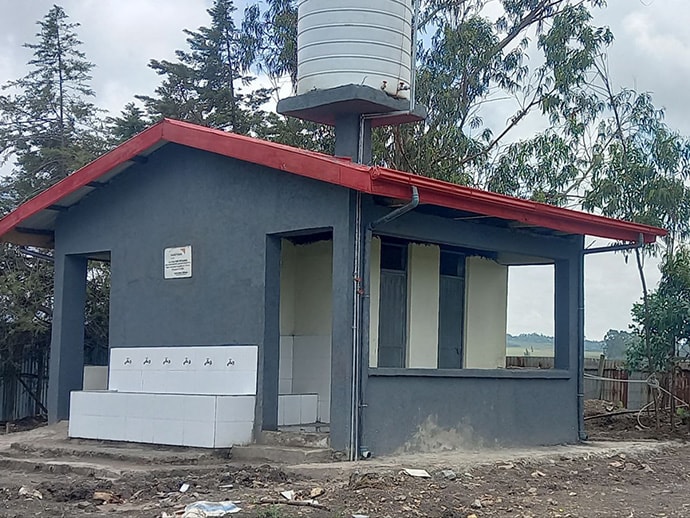By Aneesh Chatterjee

Community Water Point- Nono Chemeri -Abdi Boru Primary School, Yaya Gulele, Ethiopia. Photo: World Vision
Facing the fallout of ongoing armed conflict, impending natural disaster and subsequent resource scarcity is Ethiopia, ranking at 9 out of the top 10 most at-risk countries for humanitarian emergencies on the Independent Rescue Committee’s 2024 Emergency Watchlist. From a three-year drought to overbearing floods in vulnerable regions, rampant food and water insecurity is projected to be on the rise, driven by military tensions and an influx of displaced persons from neighboring states. In Ethiopia, and across Somalia, Kenya, Djibouti and Eretria, an estimated 20 million people are predicted to be in dire need of food and water assistance by UNICEF.
In turn, organizations have taken steps to mitigate the crisis and build resilience in communities from the ground up. The Rotary Foundation and World Vision (a member of GlobalWA since 2009), with decades of multi-sector experience in global development and crisis management, have partnered to address water scarcity in Ethiopia through specialized, on-the-ground interventions in targeted communities. Their efforts not only include the establishment of access to vital resources like clean water, but an inculcation of sanitation habits and community-mobilized hygiene awareness that promises long-term resilience against diseases and malnutrition.
Tim Arnold is a long-time Rotarian with the Redmond Rotary Club and Rotary District 5030 and deeply involved in the water project in Ethiopia. He emphasizes the urgency of their mission. “We realized that without clean water, everything else we were trying to achieve—education, health, economic stability—was being undermined. Clean water is the foundation upon which sustainable development is built.”
To learn more about their collaboration in Ethiopia, GlobalWA spoke with Brian Gower, Senior Director of Foundations and Partnerships at World Vision.
What is the Rotary Foundation?
Rotary is the largest civil society organization in the world, with a global network of 1.4 million neighbors, friends, leaders and problem solvers who unite to create lasting change – across the globe, in our communities, and in ourselves. Rotary is known globally as a leader in eradicating polio, contributing more than $2.1 billion and countless volunteer hours to protect nearly 3 billion children in 122 countries from this paralyzing disease.
Since 2002, World Vision has been a collaborating partner with Rotary on large-scale global grants focused on water, sanitation and hygiene (WASH) and a number of other sectors. Together, both organizations have invested $50 million dollars in collaborative projects, transforming the lives of over 56 million people around the world.
A featured partnership project of 2023 was in a rural area of Ethiopia called Yaya Gulele.

Schoolgirl, Yaya Gulele, Ethiopia. Photo: World Vision
Why did World Vision partner with the Rotary Foundation?
World Vision understands the importance of our joint ventures. Rotary recognizes the value of World Vision’s expertise and professionalism, our focus on sustainability, and our diligence in reporting and accounting. Also, with matters of intervention, World Vision’s local staff bringing a physical presence with feet on the ground have significant impact when working with local governments. The Rotary Foundation’s trust was demonstrated when they selected World Vision as a partner for the first Program of Scale grant of $6M, and most recently for a $30M grant with the Rotary Health Communities Challenge.
Why did you choose the Yaya Gulele region in Ethiopia for this initiative?
Ethiopia ranks 173 out of 187 countries on the 2014 Human Development Index. The average household income is 100 USD per month, and 34.7% of the population lives below the poverty line.
Of the 84 million people living in rural Ethiopia, 69% lack access to clean water or rely on unimproved water sources and 96% lack access to safe sanitation. In Ethiopia, 60-80% of communicable diseases are caused by a lack of safe water access, poor sanitation facilities and scarce hygiene practices. In addition, an estimated 50% malnutrition-related problems are caused by environmental factors surrounding the lack of basic sanitation in the region.
There are strong links between sanitation and stunting, and open defecation can lead to fecal-oral diseases such as diarrhea, which can cause and worsen malnutrition. Diarrhea is the leading cause of child mortality rates in Ethiopia, accounting for 23% of all deaths of children under 5 – more than 70,000 a year.
Yaya Gulele is a district in the North Shwa Zone of Oromia state. World Vision has been operating there since its inception in 2007. The district has a total of 24 schools, but only a few of them have their own safe drinking water supply. Thus, World Vision and Rotary – in collaboration with the district administration and local communities – has planned the construction of a water supply project from multiple sources for many of these rural and semi-urban schools. Most of the water sources, including shallow wells, will be equipped with solar power options to draw water.
Furthermore, learning cannot proceed properly without WASH facilities in schools. Integrating practical activities around safe drinking water, sanitation, and handwashing into lessons and daily tasks help reinforce the adoption of healthy behaviors in students and their families.

Global Hand Washing Day Celebration at Fital Primary School, 2024, Yaya Gulele, Ethiopia. Photo: World Vision
What is the scope of this collaboration?
The is a collaborative project between the Rotary Club of Redmond (District 5030), the Rotary Club of Addis Ababa Bole, World Vision US, and World Vision Ethiopia. The project duration is 2 years, with a total budget of $680,000, including $340,000 raised by Rotary and the rest matched by World Vision.
One of the areas in the original proposed plan for intervention was called Daleti. World Vision and Rotary were unable to access this location due to the insecurity and conflict. This area was going to provide WASH to the Dirre Daleti primary and secondary schools, reaching 963 students and 28,062 people from the surrounding community. Other schools impacted were Nano, Tigi, Illu, and Qare Yasa primary schools with a total of 2,509 students and nearby community members.
Rotary and World Vision came together on the 15th of March, 2023, and decided on an alternative site called Fital Town. Although Fital has fewer schools (9, compared to Daleti’s 14), the number of beneficiaries at Fital are 48,719 – significantly more than those in the Daleti site, on account of Fital Town being a semi-urban center with a higher population density.
What are the project’s goals?
This WASH in Schools project aims to improve the health and learning performance of school-aged children – and, by extension, that of their families – by reducing the incidence of diseases related to water and sanitation. WASH in Schools focuses on the development of life skills and the mobilization of parents, communities, governments and institutions to work together to improve hygiene, water access and sanitation conditions. Interventions for this project include the construction of safe water supply points, hand washing stations and sanitation resources. Fully integrated life skills education, focusing on key hygiene behaviors for school children, are also a priority. Ventilated, accessible pit latrines with access ramps are to be added, as well as access to menstrual hygiene products for girls.
To ensure long-term feasibility, teachers and community members will be trained on the operation and maintenance of water supply structures. Replacement parts are readily available in local markets. The supervision of any major maintenance needs will fall to the Education Office of Yaya Gulele, in collaboration with the Water Office.
Rotarians, in particular, will supervise the overall project implementation, manage progress reports, participate in review meetings with all pertinent stakeholders and partners, and ensure that set standards of implementation are being met.

VIP Latrine -Burka Aleltu (for girls), Yaya Gulele, Ethiopia. Photo: World Vision
What are some of the biggest challenges you’ve faced?
The ongoing conflict between the Ethiopian and forces in Tigray, Amhara and Oromia have thrown the country into turmoil. Security concerns have made it nearly impossible to work on development in certain areas.
Beyond that, we have faced challenges in securing the necessary funds for the project – something that our partnership with World Vision has greatly helped with. There were significant delays in getting the project approved, and even further delays in approving the change of target sites due to security concerns forcing teams to move. Certain supplies that had to be imported internationally, like solar panels and pump materials, also had noticeable delays.
Nonetheless, there have been successes. As we’re currently 1.5 years into the 2-year project, we’ve completed half of the project’s total set of goals.
What are some of the milestones reached so far?
We have equipped thousands of Fital Town residents with reliable water access via the completion of our pipeline extension to a local water source. Beneficiaries not only include school students, but health centers, internally displaced persons and the related families and communities at large. In schools alone, a total of 3157 students and 163 teachers now have safe water access, with a total of 11 access points constructed across multiple schools.
We’ve fully completed the drilling of 3 new water wells in Abdi Boru and Wabe sites. We have installed solar pumps with 4 solar panels, equipped with plastic water tanks and tanker stands. We’ve fully installed a 6-faucet water pipeline across 3 schools in Yasa Lemil, Dide Guba and Burka Aleltu, and achieved 90% completion at 2 schools in Nono Chemeri and Abdi Boru.
*
From its formation in 2002, World Vision’s historic partnership with the Rotary Foundation has implemented 22 intervention projects, with 5 more in progress, addressing disease crises and resource scarcity. Collectively, their projects have raised over $50 million and brought relief and support to over 5 million beneficiaries across the world.